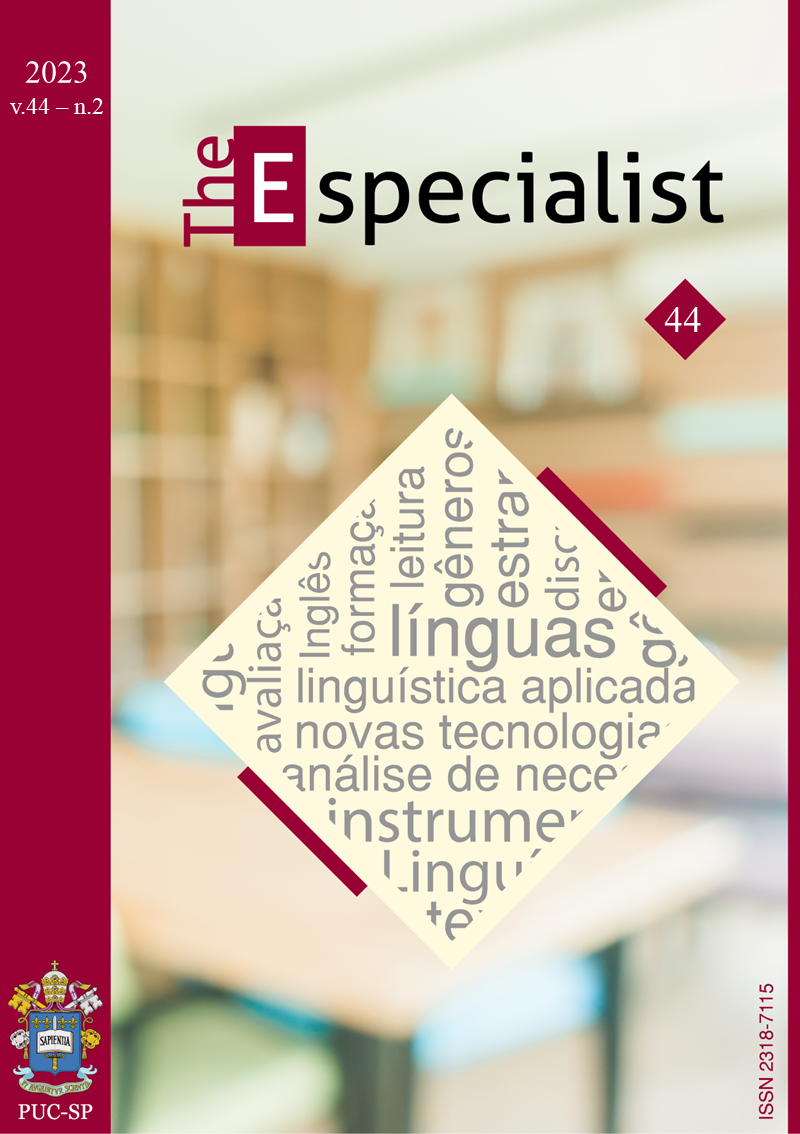The rhetorical organization of the set of executive summaries of the thematic documents of the United Nations in Brazil to implement the 2030 Agenda
Keywords:
Discursive genres, Sociorhetoric, CARS modelAbstract
The contributions of sociorhetoric to the study of discursive genres (oral and written) have been very significant, especially with regard to mapping and understanding the rhetorical organization of the various texts with which we have contact in our personal and professional lives. The English socio-rhetorical line conceives the textual genre as a social action moved by a communicative purpose that presents recurrence of discursive properties legitimized and agreed upon by a discursive community, serving as a framework for the production of individual texts. The communicative purpose is understood, then, as the purpose that motivates a writer/speaker to produce texts, being it an element considered key to the classification of a genre. Added to the concept of communicative purpose, the CARS (Create A Research Space) model, proposed by Swales (1990), supports the study of the rhetorical organization of a text, enabling the analyst to map the rhetorical movements (moves) and the sub movements (steps) that are used by the authors in the progression of the content when producing a discursive genre. The analysis of the rhetorical organization of the executive summaries of the thematic documents of the United Nations in Brazil revealed that, although the summaries share the same communicative purpose, the texts do not maintain a rigid standard with regard to the rhetorical structure, with some variation of the structural organization in the texts, which is in line with the socio-rhetorical theory of genres.
Keywords: Discursive genres; CARS model; Sociorhetoric.
References
BHATIA, Vijay K. Genre analysis today. Revue Belge de Philologie et d’Histoire, Bruxelles, 75:629-652. 1997. [Tradução: Benedito Gomes Bezerra] Rev. de Letras – Nº. 23 - Vol. 1/2 - jan/dez. 2001.
BHATIA, Vijay K. Analysing Genre: Language Use in Professional Settings. NewYork: Longman, 1993.
BAZERMAN, Charles. Gêneros textuais, tipificação e interação. Judith C. Hoffnagel; Ângela P. Dionísio (Orgs.). 3. ed. São Paulo: Cortez, 2009.
BORGATTO, Ana Maria T. et al. Projeto Teláris: Português. 1ª ed. São Paulo: Ática, 2012. (obra em 4 v. para alunos do 6º ao 9º ano)
GARCEZ, Lucélia. A escrita e o outro. UNB. Brasília, 1998
NAÇÕES UNIDAS NO BRASIL. Documentos temáticos: objetivos de desenvolvimento sustentável 1.2.3.5.9.14. Org. Haroldo Machado Filho. Brasília, 2017. Disponível em: < https://www.undp.org/pt/brazil/publications/documentos-tem%C3%A1ticos-ods-1-2-3-5-9-14>. Acesso em: 20 mai. 2023.
PÁDUA, Elizabeth Matallo M. de. Metodologia da Pesquisa: abordagem teórico-prática. 1ª ed. Revista e atualizada, Campinas, SP: Papirus, 2004.
Ramos, Wiliam César. Um roteiro para a escrita de abstracts de artigos de pesquisa: estrutura retórica e técnicas de argumentação. 2011. Tese (Doutorado em Linguística e Língua Portuguesa).
SWALES, John Malcolm. Genre Analysis: English in Academic and Research Settings. Cambridge (UK); New York: Cambridge University Press, 1990.
SWALES, John Malcolm. Re-thinking genre: another look at discourse community effects. In: Re-thinking Genre Colloquium Ottawa: Carleton University, 1992.
SWALES, John Malcolm. Theoretical and methodological issues. In: _____. Research genres: explorations and applications. New York: Cambridge University Press, 2004. p. 60-98. (Tradução de Wiliam César Ramos).
Published
How to Cite
Issue
Section
License
Copyright (c) 2023 The ESPecialist

This work is licensed under a Creative Commons Attribution 4.0 International License.
The authors grant the journal all copyrights relating to the published works. The concepts issued in signed articles are the absolute and exclusive responsibility of their authors.


 Esta obra está licenciada com uma Licença
Esta obra está licenciada com uma Licença 